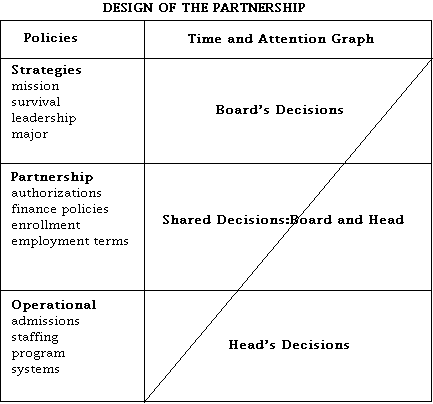Reflections on the Retreat
30 November, 2001
Present: John Braman, Joe Davison, Nan Fawcett, Margie Figgins, Barb Garlinghouse, Lucy Hansen, Belle Hinshaw, Ken Hinshaw, Richard Johnson, Mark Quee, Bruce Rohwer, Nancy Ryan, Jennie Schmidt, Perry-O Sliwa, Dan Treadway, Irving Treadway, George Welch, Sarah Giffen-Hunter.
Preface
These are Joe Davison's personal reflections on the retreat. Additional notes are under construction: Notes on the RetreatReview of LRP action steps
The meeting started with Ken reviewing the LRP action steps and providing an assessment of the current status. In general, while there are some areas where we need either to put some effort or drop them from the plan, we have made significant progress over the past several years. Of course, anyone who visited the school 5 years ago and today could tell you that!
John Braman's Talk
Then John Braman, head of ISACS, spoke on the relationship between Committee,
Head, Faculty, and long range planning. It seems clear that the current
team has a shared understanding of these things. John had a diagram,
 that helped illuminate the topic This diagram is from p. 53 of the
Trustee Handbook. In general, it seems we are farther along than he anticipated.
that helped illuminate the topic This diagram is from p. 53 of the
Trustee Handbook. In general, it seems we are farther along than he anticipated.
I was not present for Pat Bassets' meeting, but I saw great similarities between John's message and Reck Niebuhr's:
- Scattergood is an amazing institution in terms of the educational experience we provide for such a small institution, and
- A significant task we face is marketing ourselves. We'll need a 1 or 2 page "Credo", as John called it.
Expanding on the latter point, marketing ourselves effectively requires developing shared description(s) of our program. There may need to be different presentations for different audiences (or "markets").
Developing shared description(s) effectively requires that we focus on what makes us different / unique. The "Quaker Learning Process" or "Learning Community" or some other term to use as a shorthand for this description is an important component of the description.
The thing he saw that characterized SFS was our emphasis on Experiential Education; particularly significant components, to him, were the trips, especially the way they are integrated into the curriculum, and the Farm. Several of us came away convinced that we need to expand the role the farm plays in our curriculum.
Afternoon
In the afternoon we had a discussion of the "Quaker Learning Process" tragedy and how the "ownership" for the LRP has evolved and must continue to evolve. He encouraged the School Committee to recognize that there is a limited ability to absorb new ideas (such as the need and use for a written LRP).
This candid and respectful discussion developed an understanding that "ownership" of the long range plan has been seen as with the School commitee, but needs to become recognized as the school's.
It is clear that the primary champion for the "Marketing Description"/ Long Range Plan must be the head, and the SC and staff must support that effort. To that end, Ken will develop a brief marketing description, which John Braman also called a "Credo", approximately one page long.
We saw, not surprisingly, that a major area for improvement is communication, particularly between staff and school committee. The difficulty in updating and finding the current version of the LRP remains a significant hurdle. Joe and Jeff need to get that fixed! That will help the SC see how the LRP ownership has been assumed by the school.
Summary
"We've come a long way, baby!" The school is a vital and flourishing model of what education can be. We should all be proud to be a part of it, and to celebrate our success as we continue to work on improving our marketing.